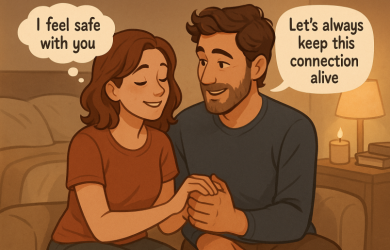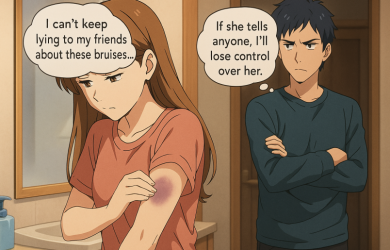5 Ways to Support your Sexually Abused Wife

Unlock Daily 30-Sec Tips for a Happier Relationship
👉 Subscribe FREEKey Takeaways
Marriage.com AI Quick Summary
There can be many faces of people who have experienced being sexually abused, either by a friend, neighbor, a partner, or even a family member.
We might not see any signs someone has been sexually abused in the past, but it’s there. It’s like a big hole of pain, trauma, and emptiness that can’t be healed.
But what if you fell in love with a sexually abused victim in the past? How can you help this person heal? Is it even possible to be the person who would support your sexually abused spouse or partner?
What is sexual abuse?
“Was i sexually abused? I’m afraid to talk about it.”
What exactly is sexually abused mean, and what percent of women are sexually abused?
When you say sexual abuse, it refers to any form of action that forces someone to oblige or do something involving sexual acts that they don’t want to do or be a part of.
Sexual abuse would also refer to any type of behavior that affects a person’s right or capability to control their sexual activity, such as refusing to wear a condom, forcing oral sex, rape, and many more.
Here are just some examples of sexual abuse:
- Unwanted touches or kisses
- Attempted rape or rape
- Forced rough sex
- Forced use of sex toys or any apparatus
- Refusing to use condoms or depriving access to birth control pills
- Sexual advances with someone who’s drugged, drunk, or unconscious
- Sexual acts because of threats or blackmail
Unfortunately, many sexually abused victims do not talk about their experiences for various reasons. Some are being blackmailed. Some are afraid of being victim-blamed; others fear how society would view them.
However, according to a survey, over 20% of women and 5% of men in the U. S alone have already been sexually abused when they were children.
What to do when your partner is sexually abused
“As the partner, seeing sexually abused characteristics with my wife breaks my heart. What can I do?”
In a relationship where one has gone through sexual abuse, it’s expected that their spouses or partners give extra understanding, patience, and love.
Here are the things that you can do when your partner has been sexually abused.
1. Listen and understand
There are different stories of sexual abuse. Some may have been wife sexually abused by a husband or a previous partner. Some people experienced sexual abuse from a friend or even a close relative.
A victim will find it hard to trust again and relay the traumatic story. Loving someone with a past like this, offer to listen.
Be there to listen and not give out your opinion. This could do more damage if done incorrectly. Just by listening, you’re already doing your partner a huge favor.
According to Maggie Martinez, a licensed clinical social worker:
It is important to let them know that it wasn’t their fault and that they are not to blame for what happened to them.
Remember, don’t force her to tell you the story. Be there and offer to listen and when the time is right, then you’ll hear the story.
Related Reading: How to Understand Your Partner Better: 15 Ways
2. Believe their story
Some people, even if they are already seeing signs someone was sexually abused, it’s so hard for them to believe the story.
Sadly, this is a common scenario, making it more difficult for the victim to open up and trust. So, when your partner opens up to you, please, believe her.
Maggie Martinez highlights that:
Too many men in society today question whether abuse has occurred. Do not be one of these people, and do not fish for details if she is not ready to tell them.
This person may have felt so alone dealing with the haunting experience of sexual abuse. Knowing that someone believes them is a big help.
3. Be a friend
This means that aside from being a partner or spouse, offer your friendship as well. Be there when she needs someone to talk to.
Be a person who can be there for her and a person she can count on. It’s also important that when she needs privacy, you will give it to her.
4. Cooperate with your partner’s requests sexually
Before committing, make sure that you are ready to understand her and her situation. Don’t break her heart by leaving her just because she’s “too much work” for you.
Instead, know that she may want to avoid sexual advances, positions, words, or even any triggers that could bring back her trauma.
Temporary abstinence will be difficult, but if you truly love and understand her situation, then this is a small sacrifice.
Related Reading: How to Talk About Sex With Your Partner
5. Give the support that they need
Hold your partner’s hand and support her all the way. Be her strength and the person she could trust.
It would be a hard battle, but with you by her side, she could slowly overcome the trauma of her past. Choosing to love someone with trauma from sexual abuse also means doing everything you can for her to move on and live afind normal life.
But how do you support a person who has experienced sexual abuse? Below are five ways you can show your support.
5 ways to support your sexually abused wife
If your spouse was a victim of childhood or teen sexual abuse, she may be unknowingly bringing some of the aftereffects of her abuse into the marriage bed.
It can be confusing and frustrating for both of you, blaming yourselves or each other for lack of connection and intimacy you can’t explain.
However, there are ways in which you can support her in feeling safe and loved so that she can open up to deeper and richer experiences of sexual intimacy.
1. Understand coping strategies, fears, and tears
When children are threatened with any kind of inappropriate behavior, whether the threat is real or not, they learn to protect themselves. They may tense up their bodies, find ways to be “invisible,” or act out in rebellious ways.
Often, these behaviors become embedded in the psyche and are unconsciously carried into adult life. The key is to help sexually abused women cope.
Though it takes time, courage, and patience to unwind the protective behaviors, it is possible to successfully shed them and be free to experience a joyful sex life.
No matter how much she loves you and wants a beautiful sex life with you, the unconscious need to protect herself may trigger puzzling fears, tears, and boundaries when you approach her for sex.
Your natural male exuberance can feel like pressure if she has shut down her own innate responsiveness. The result can be that she either pushes you away or says yes when she really means no.
If you get to understand your partner’s trauma and past, you will willingly give time and patience and help this person overcome their trauma through coping strategies.
2. Address the heightened emotions with care
The second way you can support her is to talk about it. Open the lines of communication and understanding, letting her know that you want to support her and are willing to be present with whatever happens.
If emotions arise that don’t make any sense, simply be present with her and encourage her to feel whatever she is feeling. More than likely, it’s not about you, so don’t take it personally.
There’s often a tendency to want to make the emotion mean something, but it may be completely unrelated to the present circumstances. There’s no need to assign a story or drama. Invite her to just feel rather than stuffing the emotion back down, and that will give it a chance to release and clear.
3. Sensual intimacy
The third way you can support her is to create times for closeness and sensuality that do not have a goal of sex. Give her time to warm up and let her guard down with touch, kissing, and cuddling with no agenda.
Set these times up with the verbal agreement that they are not about sex but about building intimacy. As you build intimacy together, you are also creating safety and trust, which are solid cornerstones of a happy sexual relationship.
Remember that intimacy isn’t just about sex or getting physical. Emotional intimacy, for one, could help with your partner’s healing. Slowly, she could start opening up and once she does, everything else could follow.
Dr. Taylor Burrows works as a Life and Relationship Coach, and she wants to share about the different types of intimacy and how it helps us and our relationships.
4. Sexual healing
The fourth way you can support her is to invite her into a gentle healing space that is focused on her. In this situation, she would be in a receptive, partially reclined position.
You would sit facing her with her legs draped over yours, either on a massage table, bed, or padded floor.
Make sure she is propped up enough to maintain eye contact with you without strain. Let her know that this time is for her to simply receive your love and healing energy. Be present with her and look into her eyes.
Ask permission to place your hands on her body, and if she agrees, place one hand gently over her heart center, and the other over her lower belly and rest them there in stillness.
As she relaxes into receiving, ask if you may place a hand over her pelvic area, and if she says yes, move the hand from her belly and lay it gently over her pelvic mound.
The idea is not to stimulate the area but to bring presence and healing energy.
With one hand on her heart center and the other on her sexual center, breathe and invite her to breathe as well. Stay present with whatever happens, even if it feels like nothing is happening.
If emotions arise, invite her to feel them fully and let them move.
Ask her if she would like your hands to be anywhere else on her body and follow her direction. Stay with it until it feels complete.
Related Reading: 8 Simple Ways to Seek Emotional Healing
5. Seek professional help
She may need additional professional support to help her sort through whatever emerges. As it emerges, it can be released and healed, and she will be well on her way to being open and available for a loving, joyful, and connected sexual relationship.
This very simple, powerful healing can bring up feelings and memories that may have been long buried. While it might seem inconvenient to stir things up from the past, it’s actually quite beneficial in the long run.
Couples counseling may seem scary for the sexually abused, but with your help, you can show your partner that there is nothing to fear.
The best thing you can do to help is to actually accompany her and be there with her sessions. Seek couple’s therapy because you, too, can learn so much.
Partners of sexually abused victims could learn different coping methods and techniques and other tips that will help them handle situations.
If your wife was sexually abused, there would be times that will seem overwhelming, but with the help of a licensed therapist, you can be guided on how you can deal with these scenarios.
Commonly asked questions on supporting sexually abused wife
Check out these questions on supporting your sexually abused wife:
-
What does it mean to be sexually assaulted?
“I liked getting sexually abused. That’s how I was threatened when I was a child. It was my fault for showing motives.”
Being sexually assaulted means being forced to do something sexually. This could happen to anyone, a man, a woman, or even a child.
It’s an act of violence in which the attacker takes control of their victim to do their plan. It could happen anywhere.
Sexual abuse can happen in your home, in religious places, at school, and even in workplaces.
Victims, aside from the traumatic sexual assault, may also experience victim blaming, blackmail, gaslighting, and many more that prevent them from seeking justice.
It’s time to speak up and stand your ground. Find support groups, go to couples’ therapy, open up, and go to the authorities.
Takeaway
Sexually abused people can be a friend, a parent, a neighbor, or that shy workmate. They could be someone you love or know.
Being in love with someone with a traumatic past of sexual abuse can be heartbreaking because you want to do your best to help this person.
Don’t lose hope.
You can do so much for her, and remember that being there all the way, and not giving up could already be a big leap for her recovery.
 Tips
Tips
Write your tip or submit a video tip
All tips are reviewed before the publishing.
Share this article on
Want to have a happier, healthier marriage?
If you feel disconnected or frustrated about the state of your marriage but want to avoid separation and/or divorce, the marriage.com course meant for married couples is an excellent resource to help you overcome the most challenging aspects of being married.
Related Articles
Recent Articles
Related Quizzes
Unlock Daily 30-Sec Tips for a Happier, Healthier Relationship
👉 Subscribe FREE on YouTube We'd love your feedback!
We'd love your feedback!
 Expert Q&A
Expert Q&A
Ask your question related to this topic & get the support you deserve from experts.





















 Thanks for your feedback!
Thanks for your feedback!